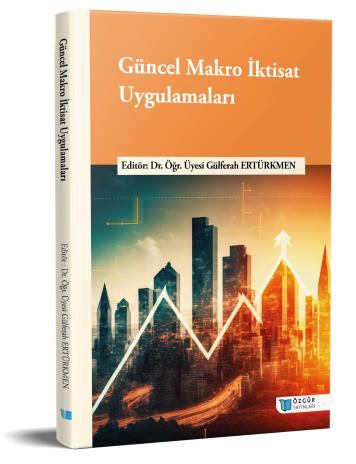
Current Applications of Macroeconomics
Synopsis
This study brings together a variety of academic research on recent macroeconomic developments affecting the Turkish and world economies. Major topics covered include economic growth, employment, public spending, energy use, trade policies and global uncertainties. Each chapter sheds light on different aspects of macroeconomics, analyzing in detail the practical consequences of economic policies and their implications for the future.
First, the problem of informal employment in the Turkish labor market is addressed and its effects on children, women and migrants are discussed. It is emphasized that informal employment puts pressure on public expenditures by reducing tax revenues and limits economic growth in the long run. In addition, the general outlook of unemployment in Turkey and the passive employment policies used to combat this problem are also analyzed extensively. It is argued that passive policies are not sufficient to solve unemployment completely and that more comprehensive, active policies are needed.
Other chapters focus on the sustainability of macroeconomic growth. The relationship between economic growth and the use of fossil and renewable energy in selected Sub-Saharan African countries is addressed as a critical issue for sustainable development. While the intensive use of fossil fuels leads to environmental problems, the contribution of renewable energy sources to growth stands out as an important component of sustainable development. These analyses evaluate the impact of energy policies on economic growth from both environmental and economic perspectives.
Global economic problems such as trade policy uncertainties and oil price volatility are also extensively analyzed. The negative impact of trade policy uncertainties on economic growth is an important risk factor, especially for open economies. It is argued that such uncertainties may cause investment decisions to be postponed and economic growth to slow down. Similarly, the macroeconomic uncertainties caused by fluctuations in oil prices for countries dependent on energy imports are considered as an important issue for the sustainability of economic stability.
Moreover, the effects of R&D expenditures on economic growth are also evaluated. These analyses, especially in the context of G-8 countries, emphasize the positive effects of technological innovation and research and development activities on economic growth. It is stated that investments in high technology and innovative approaches increase the competitiveness of countries and contribute to long-term growth.
In conclusion, Current Applications of Macroeconomics addresses macroeconomic problems in both Turkish and international economies from a broad perspective and offers solutions to today's economic challenges. Based on both theoretical and empirical studies, the articles compare economic performance and policy implementation in various countries. In this context, the book demonstrates that macroeconomic problems are not unique to one country, and that the global economy presents opportunities and challenges for every country.

